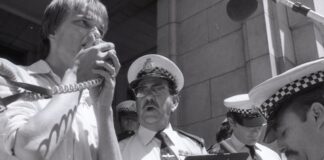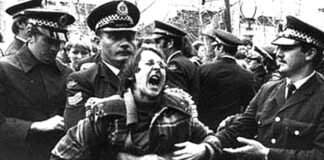A battle is taking place in Turkey to decide who will gain in the wake of an attempted military coup against President Recep Tayyip Erdogan last month.
Mass popular mobilisation halted the coup. It was a serious threat. The Turkish army has toppled elected governments four times in the past 70 years.
The coup began late on Friday evening as soldiers and tanks came on to the streets of Istanbul and the capital Ankara. Fighter jets swooped over rooftops.
The parliament building was bombed and the state broadcaster forced to read out a message saying the military wanted “to reinstate constitutional order, human rights and freedoms”.
For over an hour it looked likely that the coup would succeed. But then thousands of people came out to oppose it. They lay in front of tanks, and demonstrated outside airports and at the bridge over the Bosphorus strait which had been blocked by troops.
Firing
One eyewitness described how “The soldiers shouted at people to leave, but they wouldn’t, so they started firing into the air.
“At first the people started to back up, but more and more people were coming into the square, and within minutes they pushed back again.”
In Istanbul waiters and chefs still in uniforms were joined in opposing the military by people abandoning their night out.
It wasn’t only supporters of Erdogan who came onto the streets. Thousands of others who hate Erdogan’s authoritarian regime knew a military coup would mean even more brutal repression.
Erdogan is currently waging a bloody war against the Kurdish people. But Kurdish groups, including the HDP party, denounced the coup.
Almost 300 people died in the battle to repulse the military. The government blames Islamic cleric Fethullah Gulen, who is currently in exile in the US, for the coup.
Suleyman Soylu, Turkey’s minister of labour, even said, “The United States is behind the coup.”
Both the US and German governments waited several hours before condemning the coup. They may have waited until they saw it was failing.
But it seems far more likely that those responsible come from the armed forces. Sections of the armed forces feel that Erdogan is too Islamic and has spurned the military in favour of his own power base.
Erdogan is determined to bolster his rule after the coup attempt. He has purged the military and arrested at least 6000 people, including 103 generals and admirals.
He is also seeking to entrench his power by removing other opponents. These include dozens of newspapers, television station and radio stations, publishers and some individuals prominent in the workers’ movement.
Nearly 3000 judges and prosecutors have been dismissed and 600 educational institutions shut down, with the suspension of 15,000 teachers and the cancellation of the licences of 21,000 more in private schools.
Reports suggest that up to a third of generals, air chiefs and admirals were directly involved in the coup attempt. The remainder of the upper ranks did nothing to resist it. Such forces are the enemies of democracy and human rights.
But it’s not just Erdogan taking action. Thousands of people joined a “No to the Coup, Democracy Now” rally in the city of Izmir at the end of July. It was organised by the pro-Kurdish HDP (Peoples Democratic Party) and joined by a grouping of 45 unions and parties that organises May Day.
It followed a demonstration the weekend before of around 100,000 called by the main opposition party, the right wing social democratic CHP (Republican Peoples Party).
The protest also involved some left groups and trade unions. Its main slogan was “Against the coup and against dictatorship”.
Workers have organised against sackings, winning the reinstatement of Mehmet Demir and 21 of his trade unionist colleagues who were removed from state broadcaster TRT.
Mehmet is a trade union activist and ex-president of his union. He had been sacked on the absurd allegation that he was a member of the Gulen sect blamed for the coup. A wave of solidarity protests saved the jobs.
Rectors of Hakkari, Mersin and Tunceli Universities have resumed investigations and even begun dismissing signatories of the Academics for Peace group. It is critical of government policies and military actions against Kurdish citizens in south east Turkey.
But again solidarity can win. Ten of the petition’s signatories at the university in Van province have been reinstated after a campaign.
The coup was defeated by people taking matters into their own hands.
This opens up the possibility of both stifling the military and refusing to accept the shrunken version of democracy that Erdogan offers.
By Charlie Kimber
Socialist Worker UK





